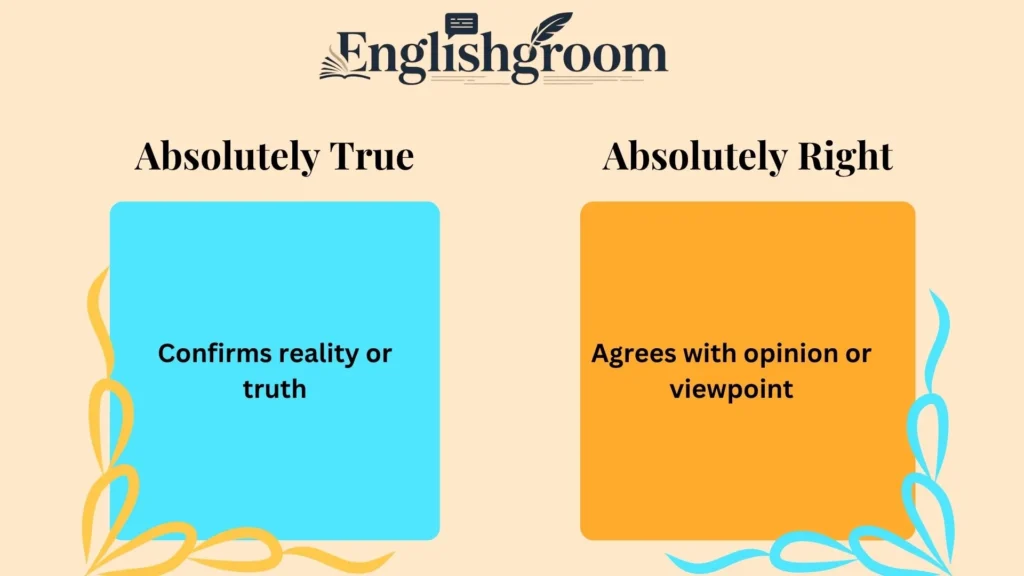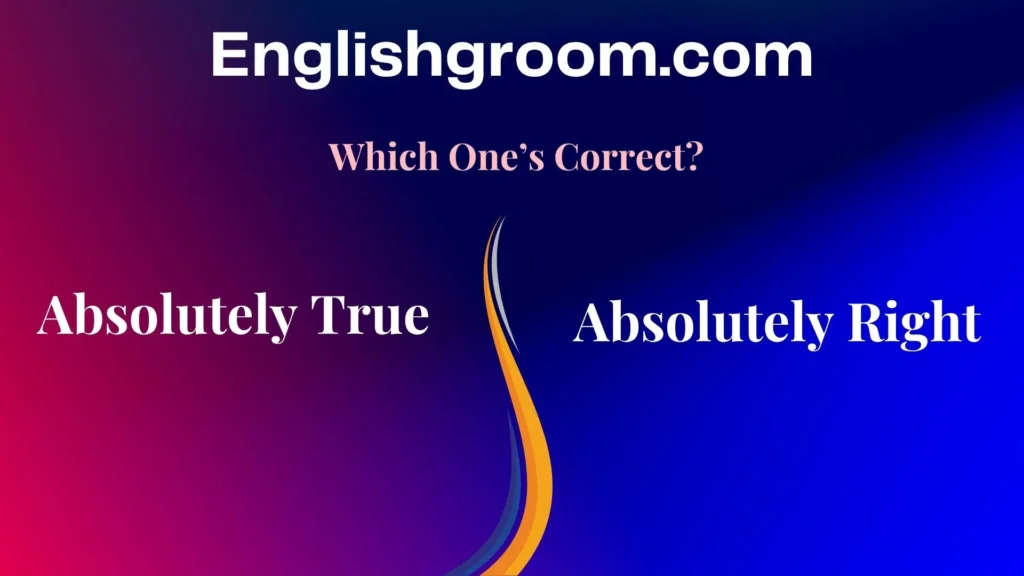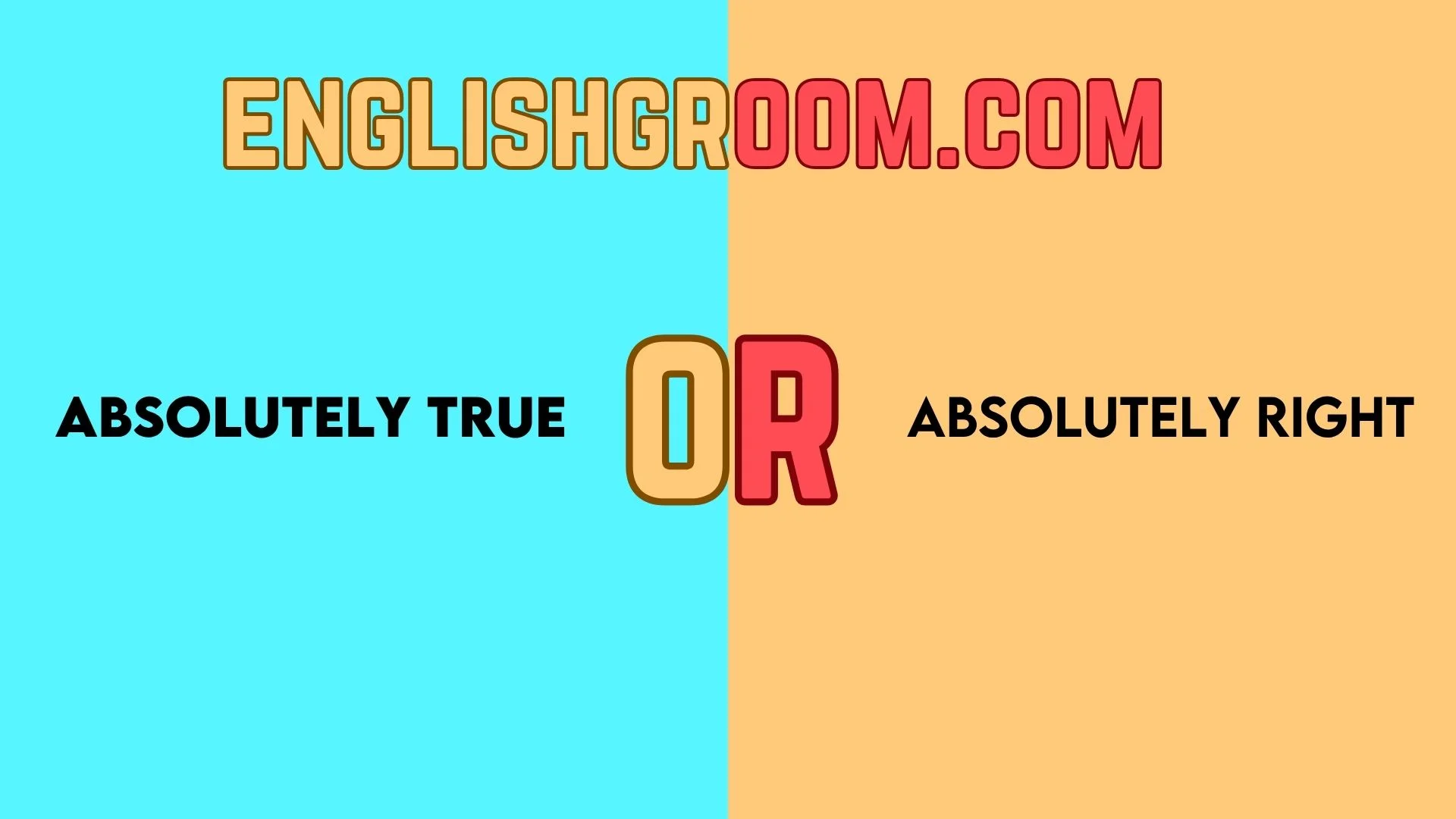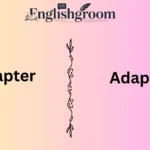Last updated on January 28th, 2026 at 04:42 pm
Language is a living thing. It changes, adapts, and often surprises us with expressions that seem both meaningful and unnecessary.
One such phrase that sparks debate is “absolutely true.”
Is it powerfully emphatic or just plain redundant?
Let’s break it down — not just grammatically, but culturally, logically, and practically — to uncover what makes “absolutely true” tick.

Why “Absolutely True” Raises Eyebrows
You’ve probably heard someone say, “That’s absolutely true!” — maybe during a debate, in an interview, or even from a close friend backing your point.
At first glance, it sounds fine. But linguists often raise a red flag. Why? Because “true” already implies something is completely factual — absolute by nature.
So why do people add “absolutely”?
Here’s the short answer: for emphasis, emotion, and conviction. But the full explanation runs deeper.
Quick insight:
| Phrase | Literal Meaning | Emotional Function |
|---|---|---|
| True | Factual, correct | Neutral |
| Absolutely true | 100% factual, no doubt | Emphatic, emotional, convincing |
The phrase isn’t wrong. It’s just more emotional than logical — a linguistic way of underlining certainty.
Understanding the Linguistic Role of “Absolutely”
Before judging the phrase, it helps to know what “absolutely” does in a sentence.
“Absolutely” is an adverb of degree — a word that modifies adjectives or other adverbs to express intensity or totality.
Examples:
- Absolutely impossible → not possible in any way
- Absolutely amazing → extremely amazing
- Absolutely clear → crystal clear, no confusion
So, linguistically, “absolutely” signals total agreement or completeness. It adds force, not information.
Why We Use It
Humans use intensifiers to:
- Express strong emotions or certainty
- Reinforce truth or reliability
- Sound persuasive or dramatic
In short: “absolutely” doesn’t change the truth of the statement — it changes the feeling behind it.
The Relationship Between “Absolutely” and “True”
Now let’s look at the relationship between the two.
- “True” means accurate, factual, or correct.
- It already carries a sense of absoluteness. Something can’t be “half true” unless it’s partially false.
So technically, saying “absolutely true” is redundant — much like saying “completely perfect” or “very unique.”
Yet, in real communication, redundancy sometimes adds emotional texture.
Example:
“That’s true” → neutral acknowledgment.
“That’s absolutely true” → total agreement, conviction, and sincerity.
So while it might raise a grammatical eyebrow, in human speech it delivers impact.
Real-World Usage: How People Actually Use “Absolutely True”
Language isn’t just about rules; it’s about how people actually talk.
Let’s explore a few real-world uses.
Everyday examples:
- “It’s absolutely true that kindness costs nothing.”
- “Her story was absolutely true — I verified every detail.”
- “That’s absolutely true, and I’ll stand by it.”
Notice the emotional tone — these aren’t cold facts. They express trust, defense, or reassurance.
Spoken vs Written English
| Context | Example | Tone |
|---|---|---|
| Spoken | “That’s absolutely true!” | Emphatic, natural |
| Written (formal) | “The statement is true.” | Precise, concise |
| Written (casual) | “It’s absolutely true.” | Conversational, expressive |
In casual speech, the phrase works fine. In academic or professional writing, it often feels overdone.
When “Absolutely True” Works — and When It Doesn’t
Knowing when to use it separates clarity from clutter.
It Works When:
- You’re expressing emotional conviction.
- You want to emphasize complete certainty.
- You’re engaging in conversation or storytelling.
Example:
“It’s absolutely true — she never missed a single match.”
Here, the speaker wants to drive home sincerity.
It Doesn’t Work When:
- The context is already factual or formal.
- You’re writing academically or reporting data.
Example:
❌ “The data is absolutely true.”
✅ “The data is accurate and verified.”
Pro tip: Reserve “absolutely” for emotional emphasis, not factual reporting.
“Absolutely True” vs “Absolutely Right”: Subtle but Significant

People often mix up “absolutely true” and “absolutely right.” They sound similar but carry distinct meanings.
| Phrase | Type | Meaning | Example |
|---|---|---|---|
| Absolutely true | Fact-based | Confirms reality or truth | “It’s absolutely true that water boils at 100°C.” |
| Absolutely right | Judgment-based | Agrees with opinion or viewpoint | “You’re absolutely right about saving early for retirement.” |
In short:
- “Absolutely true” = objective reality.
- “Absolutely right” = subjective correctness.
Tip: Use “absolutely right” in discussions, and “absolutely true” when referring to verified facts.
Cultural and Stylistic Nuances
Not all English speakers use intensifiers the same way.
Regional Variations
- British English: tends to favor understatement; “absolutely” may sound overly dramatic.
- American English: embraces stronger affirmatives — “absolutely” is common in casual speech.
- Australian English: often uses “absolutely” conversationally, especially in agreement.
Example:
UK: “That’s true.”
US: “That’s absolutely true!”
AU: “Absolutely true, mate!”
Psychological Insight
Using “absolutely” often reflects:
- Enthusiasm or passion
- Strong emotional investment
- A desire to affirm or reassure
However, overusing it can sound theatrical or fake.
Balance is key.
Misconceptions and Overuse
Many people believe adding “absolutely” makes their point stronger. While it can, too much intensity weakens credibility.
Common Misconceptions
- Myth: It’s grammatically wrong.
- Truth: It’s not wrong; it’s stylistically redundant.
- Myth: It always improves clarity.
- Truth: It improves tone, not meaning.
Overuse Example
“That’s absolutely, completely, totally true!”
Redundant and heavy. One strong word would do.
Better Choices
- “That’s completely true.”
- “That’s definitely right.”
- “That’s undeniably true.”
Remember: The goal is to persuade, not overwhelm.
Practical Guidance: How to Use “Absolutely” Wisely
Here’s how to decide whether “absolutely” belongs in your sentence:
Checklist:
- Does the sentence express emotion or fact?
- Are you trying to emphasize certainty?
- Is your audience formal or casual?
If you’re answering yes to emotion and casual tone, go ahead and use it.
Smart Substitutes
| Purpose | Substitute | Example |
|---|---|---|
| Emphasis | Definitely | “That’s definitely true.” |
| Certainty | Undeniably | “It’s undeniably true.” |
| Completeness | Entirely | “It’s entirely true.” |
| Agreement | Precisely | “Precisely true.” |
Tone Calibration
- Formal Writing: Use “accurate,” “verified,” or “proven.”
- Informal Writing: Use “absolutely,” “completely,” or “totally.”
- Persuasive Writing: Use “undeniably,” “certainly,” or “positively.”
Quote to remember:
“Clarity is the real emphasis. Anything more is just decoration.”

FAQs About “Absolutely True”
Is it grammatically correct to say “absolutely true”?
Yes. It’s grammatically correct but stylistically redundant. It’s fine in speech, but in writing, consider simpler alternatives.
Is “absolutely true” the same as “completely true”?
Almost. “Completely true” sounds more neutral; “absolutely true” feels stronger and more emotional.
Can I use “absolutely true” in academic writing?
It’s best avoided. Use “verified,” “accurate,” or “evidence-based” in formal contexts.
Why do people say “absolutely true” if it’s redundant?
Because language reflects emotion as much as logic. It helps express sincerity, conviction, or emphasis.
What’s a better way to emphasize truth without redundancy?
Try “undeniably true,” “certainly true,” or simply “true” when the context already conveys certainty.
Conclusion: The Verdict on “Absolutely True”
So, is “absolutely true” right or redundant?
Technically redundant — yes. But functionally? It’s a tool of emotion and emphasis.
In formal settings, it’s unnecessary.
In conversation, it’s natural.
The beauty of English lies in how flexible it is. You can bend the rules for effect — as long as you know why you’re bending them.
“Absolutely true” isn’t about grammar; it’s about how strongly you want to say I agree with you.

Hi! I’m Sami, a 28-year-old content writer with a love for words and storytelling. Writing has always been my way of expressing ideas, sharing knowledge, and connecting with people. I enjoy creating engaging and well-researched content—whether it’s blogs, articles, or social media posts—that not only informs but also inspires readers. My goal is to turn complex ideas into clear, creative, and meaningful pieces of writing that leave a lasting impact.



